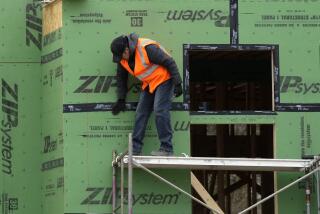Nation’s Recovery Isn’t Under Way, Fed Report Finds : Economy: Retail and auto sales are weak, manufacturing is slow, bank lending and construction are down, a Federal Reserve study says. California’s situation also continues to deteriorate.
- Share via
WASHINGTON — The long-promised national economic recovery clearly has failed to materialize, while California’s economy actually appears to be deteriorating, according to a bleak new report released Wednesday by the Federal Reserve Board.
The central bank’s monthly compendium of reports by regional Federal Reserve banks offered an all-too-familiar litany of despair for the national economy--weak retail and auto sales, a slowdown in manufacturing and downward trends in bank lending and construction.
The economic survey raised new concerns among economists about the threat of a “double-dip” recession, in which a brief period of recovery is followed by another downturn. It also came just as leading Democrats in Congress, sensing a political opportunity, were intensifying their attacks on President Bush for his failure to bring about recovery.
The news may add to pressures building in Congress to break the year-old budget agreement and offer a middle-class tax cut to stimulate the economy.
The White House also is under pressure to act. Although he had declared the recovery under way earlier this year, Michael J. Boskin, President Bush’s chief economic adviser, has acknowledged in recent speeches that the economy has been growing at a much slower pace than the Administration had expected.
Now faced with growing evidence that the economy actually has stalled, President Bush is considering whether to introduce a wide-ranging anti-recessionary “growth package” of tax cuts and other incentives.
While the Fed did not say that the nation had slipped back into recession, it acknowledged that the economy in September and early October was “weak or growing slowly.”
The new report seemed to be an official concession that Federal Reserve Chairman Alan Greenspan’s earlier declarations of a recovery were premature. The poor outlook may put more pressure on Greenspan’s Fed to cut interest rates again in an effort to jump-start the economy.
The Fed’s key policy-making committee will meet next week in Washington to set interest rate policy, and many analysts believe that the central bank will cut rates once again before year-end.
The survey, conducted every six weeks by the Fed, confirmed the fears of many economists who believe that there is a growing possibility that the nation could slip back into a full-blown recession this winter. The Fed found that weak retail sales just before the start of the Christmas buying season, poor auto sales and continued low demand for bank loans had combined to depress economic activity during September and early October.
“This is definitely a sub-par recovery,” said Sarah Johnson, an economist with DRI-McGraw Hill, an economic forecasting firm based in Lexington, Mass. “We still think the recovery is beginning, but it is a very tenuous one.”
In California, weakness in the defense and construction industries is continuing to depress the state’s economy, despite recent upswings in tourism and agriculture.
“The slump in commercial real estate continues, particularly in Southern California,” the Fed report said. In the residential real estate market, the survey found that home sales are still declining, even though home prices have stabilized. Except in the health-care industry, wage and price increases are depressed, while bank loan demand is sluggish.
The only bright spot for the banking industry is in loan refinancing, as consumers convert older, high-rate mortgages to take advantage of today’s lower interest rates.
Business confidence also plunged across the state in early October. The survey found that 85% of business leaders surveyed expect the national economy to remain sluggish far longer than they had anticipated, while 17% believe that it will be mired in a recession for another year.
“It is too soon to say the recession is over in California,” said Jerry Jordan, chief economist with First Interstate Bank in Los Angeles, who helped compile the California data for the Fed report. “The state is still contracting. There is just no pick-up.”
More to Read
Get the L.A. Times Politics newsletter
Deeply reported insights into legislation, politics and policy from Sacramento, Washington and beyond. In your inbox twice per week.
You may occasionally receive promotional content from the Los Angeles Times.








